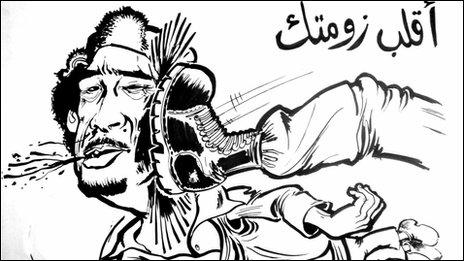New media emerge in 'liberated' Libya
- Published

New radio stations and other news outlets have emerged in eastern Libya where opponents of Colonel Muammar Gaddafi have seized control.
A new daily newspaper - called Libya - has appeared in the country's second city Benghazi, where residents have been celebrating their ''liberation'' with huge demonstrations.
And two opposition-controlled radio stations, thought to be using the transmitters of Libyan state radio that have fallen into opposition hands, have been heard from neighbouring countries.
"Radio Free Libya from the Green Mountain" - presumed to be beaming from al-Bayda - has been urging other Libyan cities to join the "revolution".
Libyan activists have been using a separate, web-based radio to broadcast phone calls from opposition supporters. Their location is unknown and broadcasts have been intermittent.
This budding media scene is in sharp contrast to the environment created by Col Gaddafi in the decades since he came to power in 1969. Under his restrictions newspapers and broadcasters have exercised self-censorship and according to the media rights body Reporters Without Borders, press freedom has been "virtually non-existent".
'We win or die'
The new daily paper Libya has been reporting on ''liberation'' celebrations, how volunteers have been cleaning the streets and how they have been giving food and shelter to foreign workers.
In its first edition, dated 23 February, the broadsheet chronicles the violent struggle before the city's fall, and carries pictures of ''martyrs'' of the battle for control.
The paper carries the strapline "We do not surrender - we win or die", the words of Umar al-Mukhtar, a Libyan resistance leader during the Italian occupation.
The masthead includes Libya's national flag before Colonel Gaddafi took power.
The uprising has created opportunities for citizen journalists. Pictures and videos of developments - violence, the aftermath and celebrations - have made their way from Libya onto Facebook pages which have been providing a continuous stream of updates. Facebook and Twitter are reportedly blocked inside the country but users have apparently managed to circumvent restrictions by using proxy servers and other means.
The citizen journalists provide an alternative to the official media in their portrayal of the protests and the turmoil across the country. While state media showed only pro-Gaddafi protests, pictures and video from mobile phones told a different story.
Meanwhile, the changes in eastern Libya appear to have encouraged established news media to adjust. The Benghazi-based Quryna daily has started to report on the unrest - though it has not been taking sides. There have been reports that the paper has been seized by protesters.
The Libyan government has declared foreign journalists working in the eastern areas without official sanction ''outlaws''.
BBC Monitoring selects and translates news from radio, television, press, news agencies and the internet from 150 countries in more than 70 languages. It is based in Caversham, UK, and has several bureaux abroad.
- Published20 October 2011
- Published21 February 2011
- Published21 February 2011